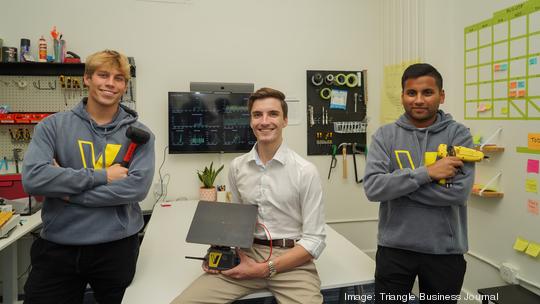
The eureka moment happened in a shower stall in Chapel Hill.
Then-UNC sophomore Ritwik Pavan was running late, showering quickly so he could make a meeting.
“I was thinking about how frustrating it would be to have to park on Franklin Street,” he said. Somewhere between shampoo rinses, that frustration became an idea – one he would write down as soon as he dried off. Flash forward through several brainstorming sessions, and that idea became a startup, Vade.
Over the past several months, its technology has been analyzing loading zones in Raleigh. It’s being used in Florida to track vacant parking spaces at rest stops for truck drivers along interstates. Soon, it will be piloted in the city of Austin, Texas. Eight cities are using the technology, “and plenty on the waiting list,” Pavan said.
And it’s just getting started, having raised a little under $1.5 million in growth capital, including a $428,000 round last year.
In an interview, Pavan, who co-founded the company alongside his dorm neighbor Matty Schaefer and N.C. State University entrepreneur Christian Burke, talks about the trajectory, from a parking app idea to an urban planning tool, and why flexibility is key when it comes to finding a market for innovation.
The technology started with three friends. Pavan and Schaefer had met during an admission program for the university’s business school before winding up, randomly, with dorms on the same residence hall floor. Pavan met Burke his sophomore year – having heard about his success making, of all things, “fidget spinners.”
“It was really cool,” Pavan recalls.
The friends had the entrepreneurial itch long before they started Vade. They used to brainstorm random ideas – from real estate ventures to startups that just never appeared ready to move off the white board. Then came the shower idea. Pavan’s co-founders thought it had legs. They were frustrated with parking too. So were the Chapel Hill residents Pavan felt out. But the trio realized it was a much bigger idea than just Chapel Hill, as parking frustrations are practically universal. The problem seemed set – it was just what to do about it, and how to leverage a solution into a business.
Flexibility would be key.
In the early discussions, they explored possibly allowing for the rental of private lots and city residents’ own parking spaces to tackle parking availability – but they shifted their idea when they realized the potential liabilities. They decided the best way to tackle the problem was by targeting the metros themselves.
And that’s when it really started to click. Cities wanted to understand how their curbs were being utilized so that they could make decisions. So Vade stepped up to collect the data.
In Raleigh, it has solar powered cameras set up at Loading Zones.
“We’re providing them with a dashboard,” Pavan said. It contains information on what kinds of vehicles stop at the loading zones, how long they stay, how many arrive an hour. The data is collected and the images are deleted to protect privacy. “The images aren’t being used for any Big Brother-type stuff.”
The City of Raleigh uses the information to make decisions about curb use downtown. And Pavan hopes to leverage its discussions with Raleigh to expand the partnership, perhaps offering some kind of service that would help citizens find parking spots.
By switching the focus from just parking to curb use, Vade opens up a lot more use cases, Pavan said. And that puts the company in the position of being able to make analytics pitches to multiple metros. More than 30 cities are on a waitlist to be considered for the next pilot project, he said.